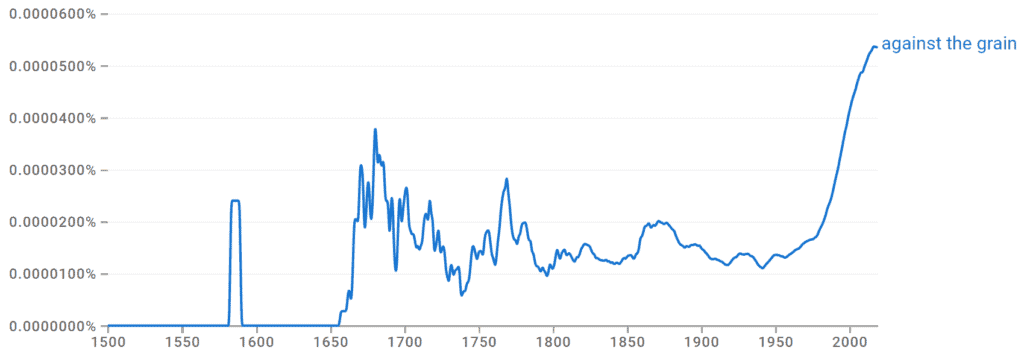Idioms are words and phrases that have figurative uses. They are popular to use within the English language to help create analogies and provide detail beyond what simple messages may be included in a sentence.
Against the grain is an idiom with logical, literal origins. Its roots are used to describe how to work with the grain of the wood to help smooth and finish and that one should go with the grain rather than against it to avoid damage. However, when used figuratively, it highlights somebody doing something different.
Let’s take a closer look at how this term came to be used in a figurative sense and how you can use it in a sentence.
What Is the Meaning of Going Against the Grain?

Going against the grain can have some variances in specific meanings. However, in context, it means doing something different than what is considered usual or customary in current society.
Sometimes going against the grain highlights something contrary to one’s natural inclination, meaning it is difficult to accept or do because there is a conflict concerning personal principles or beliefs.
For example:
- The problem with many youths today is that they mistakenly believe that it goes against the grain to stand up for their beliefs in society, when in fact, they are failing to be true to themselves by failing to do so.
- It was against the grain for her to agree with his viewpoints, but she did so to help keep the peace and avoid a more significant conflict.
Often, when one goes against the grain, it is used in a more generalized context to explain someone doing something different than societal norms or doing something unexpected.
For example:
- It is a bit against the grain, but paper receipts are still more helpful than digital receipts to make returns on items you have purchased.
- The running back worked against the grain of the opposing team to complete a 56-yard run and score the winning touchdown.
Going Against the Grain Origins

In a literal sense, against the grain was an old term used in woodworking. When one went against the grain of the wood, it would create difficulties in finishing. One must go with the grain to properly smooth the wood and finish a product. This practice is referenced back to the 1500s but would be thousands of years old in practice.
The first reference pertaining to going against the grain in a figurative sense is documented in Shakespeare’s Coriolanus, first performed in 1607.
“…Preoccupied with what you rather must do / Than what you should, made you against the grain / To voice him consul: lay the fault on us.”
Let’s Review
In woodworking, you always want to go with the grain when sanding and finishing. This allows you to create a smooth, workable surface.
In life, going with the grain means going along with society or with what is expected. When one goes against the grain, it represents behaviors or actions that are unexpected or unusual. Often, the term is used to highlight somebody standing up for themselves and not giving in to the status quo.
It can also be used simply to highlight the unexpected actions of a person.
Check out some others we covered:
